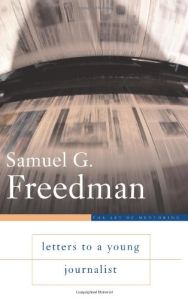
Recommendation
American journalism is deeply flawed, but not fatally so, reporter Samuel G. Freedman argues in this clear-eyed critique of his calling. As one deeply steeped in his trade, Freedman offers both a damning indictment and an inspiring call to the next generation. Freedman structures his analysis as a series of letters to one of his students, and manages to strike just the right balance between the theoretical and the practical. He seasons his study with plenty of war stories from the front lines of journalism. In a business full of cynics, Freedman comes across as an idealist, one reporter who believes in the power of the press to change the world, in spite of dwindling readership and advertising revenue. getAbstract recommends this slim volume to anyone who works in the media or needs to understand its best intentions.
Summary
About the Author
Veteran newspaper reporter Samuel G. Freedman teaches journalism at Columbia University and works as a columnist for The New York Times. He has written five books, including The Inheritance and Who She Was. He has been a finalist for the Pulitzer Prize and the National Book Award.







Comment on this summary